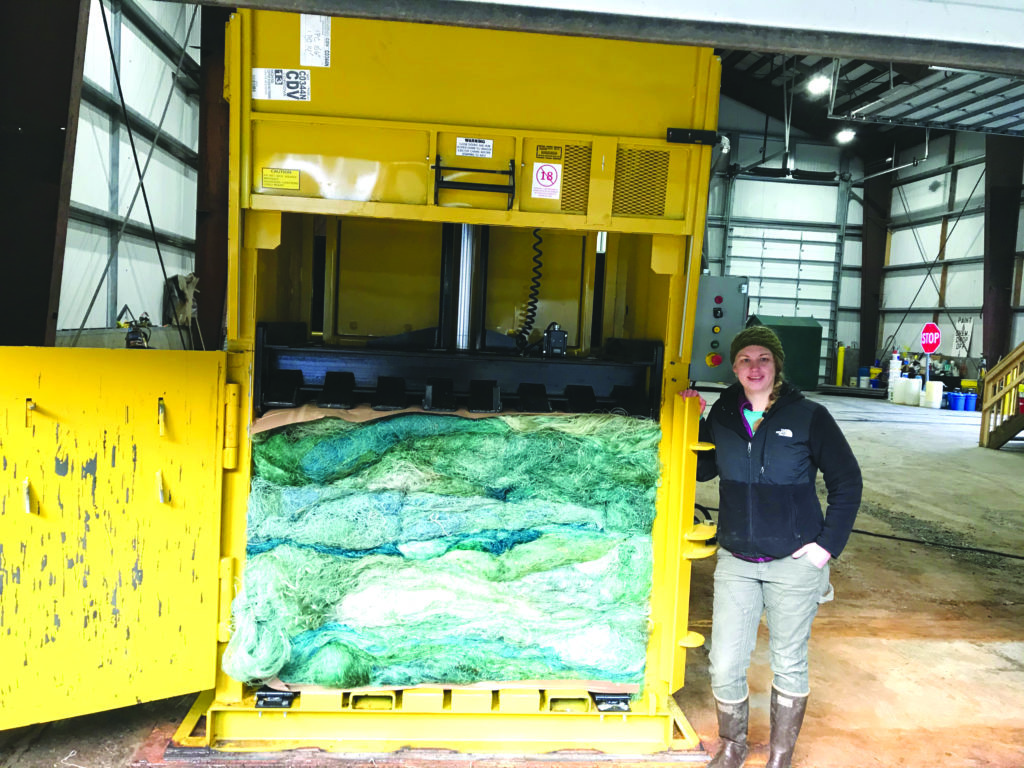More snow is in the forecast for Cordova this week, but that’s not stopping the Copper River Watershed Project from looking forward to spring and the odds of shipping out a container load of old commercial gillnets for recycling in Portugal. They would be made into raw plastic for new products.
Right now, CRWP has six bales of worn-out gillnet, cleaned and stripped of any extraneous seaweed and more, each weighing at least 600 to 800 pounds a bale, says Shae Bowman, operations manager. The bales are tightly compacted, thanks to a $48,000 baler purchased by CRWP this past year, with funds from the Rasmuson Foundation. The container, an in-kind donation from the Native Village of Eyak, will be used to ship the nets to Net Your Problem in Seattle, where founder Nicole Baker, a University of Washington fisheries researcher, will ship them on to a new recycler in Portugal.
As the demand for recycled products grow, Baker and others are working with commercial fishermen to keep old gillnets out of landfills, to give them new life in new products. NYP has already shipped some 12,000 pounds of gillnets from Southern California to recycling centers to be made into new products ranging from Sunglasses, kayaks, socks and bathing suits to 3D printer filament.

Baker is now promoting fish net recycling from California and the Pacific Northwest to America’s biggest fishing port, New Bedford, MA. NYP also announced a partnership with Waterhaul, a producer of designer sunglasses, to promote their sunglasses made from recycled fish gear plastic.
Collecting the drift gill nets in California was done with support of the California Department of Fish and Wildlife the Ocean Protection Council and the Pacific States Marine Fisheries Commission.
“Opening people’s minds up to new possibilities is so empowering, and that’s just what we’ve done here, taking old fishing net ‘garbage’ and giving it a chance at a whole new life,” said Sara Aubery, business and program development manager for NYP in San Diego CA.
Bowman had plans early in 2020 to encourage more commercial fishermen to clean discarded gillnets, stripping them of all organic materials before bringing them in to donate, when the global pandemic of the novel coronavirus began spreading through Alaska. Now she’s hoping to get the container filled with bales of old nets and shipped out this spring.
CRWP is also working with Grundens to recycle nets into product that can be used in Grunden’s new net-sourced line of products.
Cleaning the nets involves spreading them out to dry, and a lot of seaweed and stuff. “If you dry it out most of the organic material will fall out itself,” she said. “It’s really not that hard. The program will run so smoothly if people will just take the extra hour to clean them up,” she said.
Further information about the program is at copperriver.org/programs/recycling/fishing-web-recycling.
Editor’s note: An earlier version of this story incorrectly identified Shae Bowman of Copper River Watershed in the photo above as Sara Aubery of Net Your Problem.














